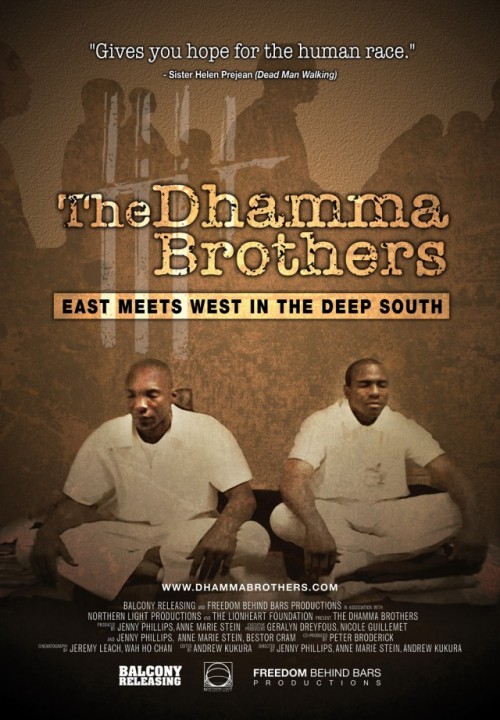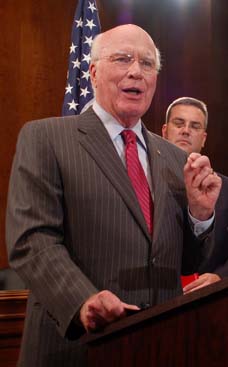
Ms. Phillips, a cultural anthropologist and practising psychotherapist in Concord, Mass., has spent a considerable amount time in prison herself, though not for any violation of state or federal law. Jenny Phillips uses Vipassana meditation to help convicted felons. She also produced a book and a film on the topic. Jenny Phillips uses Vipassana meditation to help convicted felons. She also produced a book and a film on the topic. She hangs with convicted thieves, murderers and rapists because she believes that a 10-day, 100-hour course in Vipassana meditation will lead them not only to manage stress and anger, but teach them that "experiencing and observing one's misery with constancy and equanimity, looking at it squarely with patience and fortitude – is the path to experiential understanding and the liberation from suffering …"
Lesotho RPCV Jenny Phillips uses Vipassana meditation to help convicted felons
Inner freedom in an unlikely setting
August 11, 2008
GERALD HANNON
From the Globe and Mail, August 11, 2008 at 9:50 AM EDT
Leon Kennedy, a young African American, is serving time for armed robbery in Donaldson Correctional Facility, the most notorious maximum security prison in Alabama.
"Had I learned how to love, even as a 10-year-old boy, things would have been different," he said, not long ago. "I keep referring back to this love thing. It's just so important to the universe, you know. It expands more than just an emotion – it's a way of life. How we interact with each other and see each other … it's amazing. I had to come to prison in order to be free, and it's stupid, I guess, but it happened."
He was speaking to Jenny Phillips, and her interview with him appears in her book, Letters from the Dhamma Brothers: Meditation Behind Bars, to be published next month (she is also the producer and director of the documentary film The Dhamma Brothers).
Ms. Phillips, a cultural anthropologist and practising psychotherapist in Concord, Mass., has spent a considerable amount time in prison herself, though not for any violation of state or federal law.
Jenny Phillips uses Vipassana meditation to help convicted felons. She also produced a book and a film on the topic.
Jenny Phillips uses Vipassana meditation to help convicted felons. She also produced a book and a film on the topic.
She hangs with convicted thieves, murderers and rapists because she believes that a 10-day, 100-hour course in Vipassana meditation will lead them not only to manage stress and anger, but teach them that "experiencing and observing one's misery with constancy and equanimity, looking at it squarely with patience and fortitude – is the path to experiential understanding and the liberation from suffering …"
Sounds far-fetched, I know. Seems to work, though.
Vipassana, which means "seeing things as they actually are," is a Buddha-inspired system of meditation (the way of the Buddha is known as the Dhamma).
As she writes, "This technique involves the observation of ordinary, actual sensations throughout the body, moment by moment, and understanding their impermanent nature. … Incrementally, one overcomes deeply conditioned habitual reactions and emerges with a profound inner freedom and equanimity."
Ms. Phillips has long been fascinated by the offbeat, perhaps partly because she is so white, middle American, middle class herself. She grew up in Alliance, a small Ohio city. She studied nursing, then spent some time in the Peace Corps with her husband in the small south African country of Lesotho. She returned "with a burning interest in anthropology … I think I've always been interested in different ways of seeing and understanding the world."
She went back to school, moved to Concord with her husband after graduation and began to raise a family – rewarding, but something was missing.
"I was living in a fairly well-to-do community," she says, "and was frustrated, wanting to get into a tribe, another tribal setting where I'd be living with people unlike myself and maybe less fortunate."
She remembers one hot summer day in the late nineties, discovering an article in her local paper about a program called Concord Prison Outreach.
"It said if you're interested in volunteering to work in our local prison, to teach a program called Alternatives to Violence, call this number. Then I remember with one hand laying the paper down on the table, and with the other hand picking up the phone and calling. It was a eureka moment – wow, there's a prison down the street and this is another tribe! When I walked into that prison for the first time, I really felt I was crossing a border into a foreign land, and I must say, into a Third World country."
She spent a weekend in prison that first time (during the day – she would go home at night), and she recalls "sitting in a group with 30 male prisoners in a medium-security prison. And when the door first opened and the prisoners came flowing into the room I was, for a moment, frightened. But then I was fascinated by the potential and doggedness and commitment that these guys showed over the weekend. … I don't think I've turned back since that first day."
She valued the Quaker-based Alternative to Violence program, but "as a therapist, I wanted to do something that would get a little bit more personal, talking about your own truth, your own life, your own past."
She would eventually hear of a meditation-based program called Houses of Healing, devised by Robin Casarjian, director of the Boston-based Lionheart Foundation (an organization working toward a more rational approach to violence prevention, sentencing and incarceration in the United States), and began to teach the program in several Massachusetts prisons.
In 1999, she learned that several hundred prisoners in the Donaldson prison had become aware of the Houses of Healing program, and were meditating regularly. She decided to visit and interview some of the men – the program, remarkably, had been initiated not by professionals like herself, but by a prisoner who had found a book about it in the prison library.
The interviews persuaded her that the introduction of a Vipassana meditation program, which she had learned of through a documentary film charting its success in Tihar Jail, India's largest prison, "could provide the structure and approach to further address personal suffering."
There was some negotiation with the prison administration, but in January, 2002, Donaldson Correctional Facility became the first state prison in North America to hold a Vipassana course (it had been used in county jails before – studies there showed a significant reduction in recidivism).
That is how she came to meet and know men such as Mr. Kennedy, Grady Bankhead (sentenced to life for his part in a murder), Michael Carpenter (homicide, life without parole), Wayne Finch (homicide), Edward Johnson (aiding and abetting a triple homicide) and about 10 others featured in her book.
The men, most of them African American, sat for hours in the prison gym, closing their eyes, following their breathing, listening to their bodies. They did it for 10 hours a day, under the guidance of three of her colleagues.
When they "graduated," the prison warden attended the ceremonies. He saw hardened criminals weep as they told their stories. He urged those who had taken the course to become agents of change in the prison. Ms. Phillips and her colleagues would soon start receiving letters – many of them published in her book – from the men who took the program, men whose view of themselves and their capacity for change had been radically transformed.
Change, of course, has to start outside the prisons, beginning with the notoriously racist and punitive U.S. legal system (as of March this year, more than one in every 100 American adults is in jail or prison).
Failing that, one can hope for a system that is more rehabilitative than punitive, and Ms. Phillips believes that the "pendulum is swinging right now, back from the lean, mean eighties philosophy of stripping away treatment and education programs. We're looking for new solutions. … Most of the programs we have are cognitive behavioural treatment programs, and we ask people to change their behaviour and the way they think about things, but we don't address their past and the trauma they've inflicted on themselves and others. … You have to start with a program that deals with the deep emotional level of their damage."













